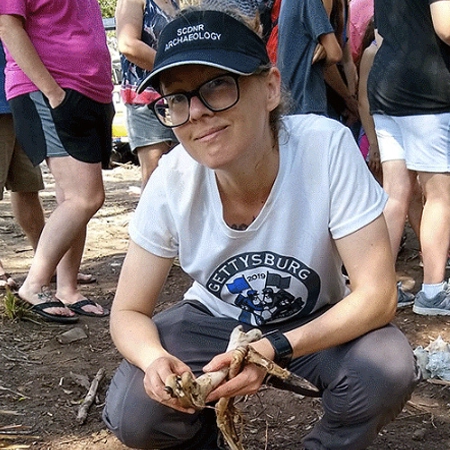
Andrea Palmiotto
It wasn’t until she got to college that Andrea Palmiotto found what she wanted to do with her life. Once she discovered anthropology, she made it her life’s work, and today as a faculty member in the Department of Anthropology, she shares that passion with her students. Learn about her in this installment of Meet Our Faculty.
What is it about anthropology that initially drew you in—and ultimately keeps you interested?
Like many other anthropology majors, I did not find it until later in my undergraduate career. I had never taken anthropology classes in high school and did not know much about the field. However, when I took my first archaeology class, everything clicked, and I saw a way to combine my interests. Archaeology involves the study of past peoples and the things they made and did. The goal is to understand how people in the past viewed and interacted with the world around them and to use that knowledge to help solve problems in today’s society. My professors were amazing and took the time to get to know the students and involve us in their research. I had the opportunity to help with local field projects and lab work and to learn what it meant to work as an archaeologist. My professors encouraged me to apply to graduate school and helped me build confidence in myself as a researcher. I loved the idea of a career that gave me a chance to work outside and make a difference in the lives of living people.
I specialize in the study of bones—human and nonhuman. These specializations have led to numerous and diverse amazing opportunities. I’ve had the chance to work on 6,000-year-old archaeological sites to study what people ate and how they moved across the landscape and to understand what animals were culturally important. I’m also grateful for opportunities to work with the Department of Defense’s POW/MIA Accounting Agency to recover and identify the remains of US service members from past conflict sites. I run a field school with my colleagues where students learn forensic archaeological skills at WWII American bomber crash sites in Germany while working on the recovery of US service members. I’m able to incorporate students into both projects and share my love of anthropology. These seemingly esoteric skills have been valuable in ways I never imagined.
Why do you enjoy teaching in this discipline?
Whether the students are anthropology majors or not, I love it when they ask questions and are interested in the materials.
Our anthropology majors ask great questions that force me to stay current on literature in the field and that have led to student thesis projects. When students from different disciplines take anthropology courses, I’m excited when we can connect the topics in class to their own majors.
Anthropology is ultimately the study of what it means to be human—it leads to broadened cultural horizons, acceptance of differences, and questioning of social norms. We are often focused on our own cultural norms, traditions, and ways of viewing the world. Anthropology helps us realize that there is no “right” or “wrong” culture, but differences steeped in history, environment, and context.
I enjoy helping students realize this and then watching them take this realization back to their own fields. Whether you study STEM, social sciences, health, arts, or other fields, you can bring an anthropological perspective to help you think creatively and approach topics in new ways.
What advice would you give students about how to succeed in college?
- Talk to your professors. Get to know them, learn about their research interests, and get involved with their projects.
- Succeeding in college is more than simply passing classes. Graduate advisors and employers are looking for good recommendations and want to see how you took ownership of your education and developed your own interests.
- Take advantage of research opportunities on campus. Your professors and other university staff work hard to arrange programs to help you succeed. At IUP, many professors include students in their research or mentor students through the students’ own research ideas. When you take on responsibility for a section of a professor’s research or pursue your own ideas under their mentorship, you’re learning the research process, contributing to bigger-picture questions, and gaining valuable professional development experiences that provide direction for your future.